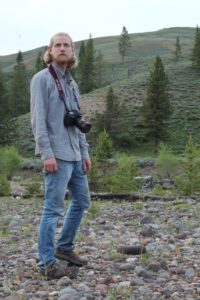I’m an ecologist with a background in forest ecology, watershed management, and arid-land botany. I was born and raised in Tucson, Arizona completing a BS in ecology and evolutionary biology and just finishing an MS in watershed management and ecohydrology at the University of Arizona. My master studies have focused on dendroclimatology in the Sierra Nevada mountains of California, specifically using conifer tree rings to reconstruct historical snow water variability over the past 350 years. Recently, I’ve been studying the effects of climate change on the strength of climate signals in these trees through the 20th and 21st centuries. Moving forward I hope to investigate ecophysiological mechanisms driving forest growth and the influence of vegetation on regional climate.
The plant functional traits course on Svalbard presents an opportunity to study leaf ecophysiology, learn to use new equipment and techniques, and immerse myself in trait-based ecological research. Specifically, I hope to learn to identify local plant species, master using the LiCor 6400, and develop research objectives for the coming year. Additionally, I hope to collaborate and share with the diverse group of researchers involved in the course to teach, learn, and enjoy some arctic ecology. I will know I’ve met these objectives when our research group is able to successfully test a hypothesis about arctic vegetation leaf ecophysiology—and can laugh about our trials in the sauna. I have to say I’m most excited to see a polar bear, but I’m generally excited to see the landscapes of Svalbard and as much of the wildlife as possible.
I think the people of Svalbard will be conscious of climate change with the drastic declines in annual arctic sea ice. I also think they will be informed that humans have played a major role in contemporary climate change. The population here consists in large part of university students and researchers while another significant portion of the population will be Scandinavian or Russian. The students and researchers should already be informed about this topic, and I believe education in Russia and Scandinavia is of a quality that these people will also be informed about this topic.
Public perceptions of climate change in the United States is as mixed as the cultural representations. It varies by region to region, state to state, city to city, and even within cities you can potentially identify areas where you expect to find differences in perception. Where I am from in Tucson, Arizona, a relatively liberal community, it’s easier to find people informed of climate change and its causes. On the other hand, there are plenty of people who are uninformed and vary from denying climate change has occurred to those who know it is happening but deny that humans are a leading cause of it. Public perceptions of climate change appear to be directly related to peoples’ levels of education.
